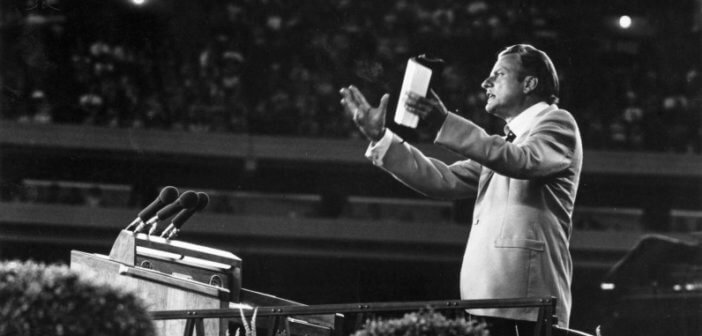Lovett H. Weems Jr. examines the legacy of Billy Graham — his miraculous rise to prominence, his ability to transcend denominational differences, and his engagement with the public leaders of his day in a spirit that fostered unity over polarization.
Billy Graham, whom Garry Wills once called “the closest thing to a national pope that we shall ever see,” died leaving a legacy that will be appreciated and critiqued even longer than the span of his amazing life and ministry.
Goodwill
Graham’s rise to national prominence across religious lines could be described as miraculous. He was evangelical when there was virtually no national coverage of evangelicals. Graham’s evangelicalism was as much about spirit as beliefs. He had what biographer Marshall Frady called “sheer elemental goodness” and was “all goodwill” so it is no surprise he neither embraced nor was embraced by those who would later use evangelicalism as a vehicle for narrow political causes.
What may be extraordinary about Graham is not that he made mistakes but that he made so few given his fame and success.
Graham knew to be suspicious of the Moral Majority because of its origins in fears of segregated private schools losing their tax-exempt status and which then morphed into a political arm of one party. But, apart from bigotry and narrow political agendas, this new evangelical activism had a tone that was not Graham. He was not capable of being mean and vindictive.
American Righteousness
In many ways, Graham was the prophet of American righteousness with all the opportunities and limitations that brings. Graham is criticized for his linking too closely the American way with the Christian way and being too quick to bless success and power, including political power. One should hardly be surprised given the shaping years of Graham’s life as well as his and the nation’s narrative during those years.
It is true that he identified with order and his nation. He had a broader vision, but it was hard for him to believe badly about his country or its leaders. John Wesley had some of the same tendencies. Graham leaned Republican as Wesley leaned Tory. But, in neither case, does their tendency toward order tell the whole story of their ministries.
The Perils of Being Pastor to Presidents
Graham grew close to presidents, and they sometimes used him for their purposes and to his disadvantage. Graham did not seem to understand how dangerous such identification with presidents could be. It was said that when the Vietnam War was going particularly badly, Lyndon Johnson would call Billy Graham to the White House. Graham was not there to speak truth to power.
Graham’s relationship with Richard Nixon became the great embarrassment of his career, leading him to such private anguish that he once said with Wesley, “When I look into my heart, it looks like hell.” “I just couldn’t understand it,” Graham said. “I still can’t. I thought he was a man of great integrity. Sometimes, when I look back on it all now, it has the aspects of a nightmare.”
Unity over Polarization
What may be extraordinary about Graham is not that he made mistakes but that he made so few given his fame and success. He was not the first preacher to have integrated crusades in the South, but he was well ahead of virtually all white Southern clergy. He was almost 30 years ahead of most independent evangelists in setting up financial transparency and accountability. Some still have not done so, as Senate inquiries in recent years documented.
Graham may have been the last person with the stature to cross denominational differences in the way he was routinely able to do in planning his crusades. He understood the evangelical heritage of many denominations better than some of them knew their own stories. No one can bridge these gaps today. No one from his family or his denomination or elsewhere can cross the divides that separate us at this moment.
Over the years it is said that Graham was encouraged to run for pollical office. He never did, of course. Once when some were thinking he should run in North Carolina for the U.S. Senate, someone noted, “Why would he want to do that? Why would he want to become one of 100 Senators when he can be the one Billy Graham?”
Related Resources
- Martin Luther King Jr.’s 4 Key Principles of Prophetic Witness by Tony Hunt
- Nelson Mandela — A Leader for His Time by Lovett H. Weems, Jr.






